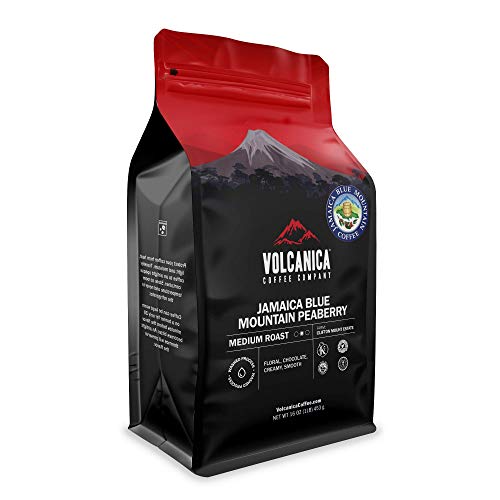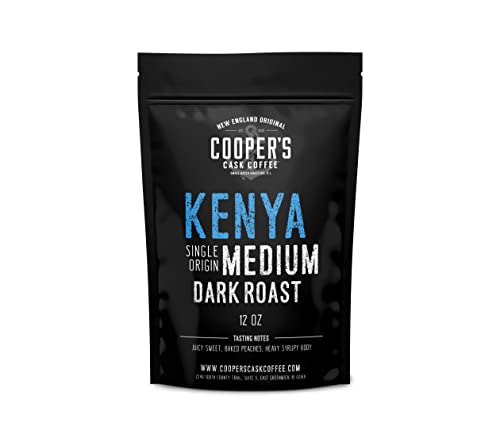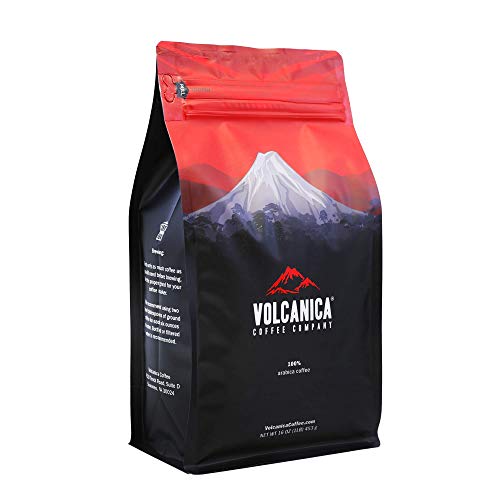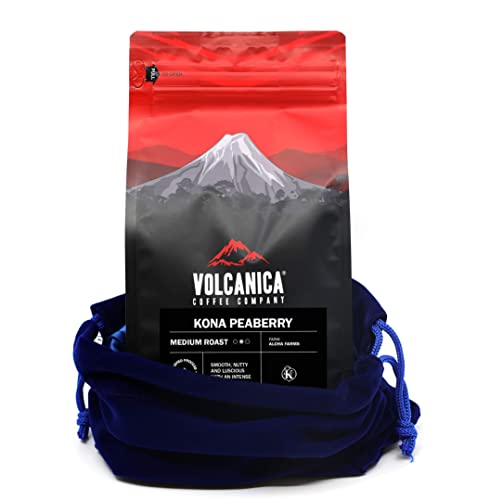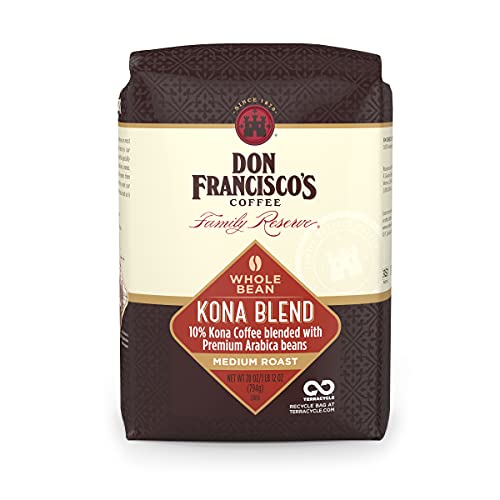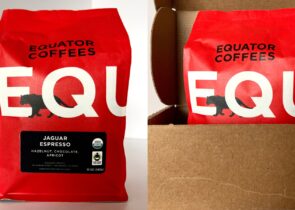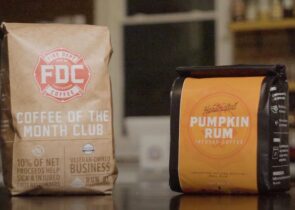With the overflowing amount of arabica coffee beans out there, it can be hard to choose what the best arabica coffee is to suit your taste buds.
Join us for a flavor-filled exploration as we highlight some of the most well-respected, delicious, highest quality arabica beans that money can buy. The most important thing to note about our search is that we are basing our options solely on the natural flavor of the beans, not on outbidding factors like price, whole bean/pre-ground, etc. Also, we’ll be primarily talking about single-origin coffees, not blends or artificially flavored coffee.
So sit back, relax, and get ready to find your new favorite single-origin arabica coffee to brew and sip on!
Arabica Coffee vs Robusta Coffee
Rookie coffee lover rule #1: Know the difference between arabica and robusta beans. Not all coffee is the same, and everything isn’t made for brewing and drinking daily.
Let us introduce you to robusta coffee beans: the sassier, more dramatic siblings of the arabica coffee beans. Both types of coffee are heavily cultivated and produced in the global coffee market, but for different purposes. Arabica and robusta beans are different in many ways and both have different flavors and caffeine levels.
For starters, arabica and robusta beans are different in shape, size, flavor, and caffeine levels. The succulent flavors and sweet taste you associate with coffee is the flavor that’s extracted from arabica beans. Alternatively, robusta beans have a bold taste and are much higher in caffeine content. In fact, robusta coffee is primarily produced as espresso coffee due to its bitter taste and more concentrated amounts of caffeine.
You can learn more about the differences between these two dynamic coffee beans, here.
The Best Arabica Coffee Beans
To bean or to brand? That is the question.
These are the two angles to consider when determining which arabica coffees are the best of the best. Sorting through the thousands of different coffee brands, varieties, roasters, and more is taxing, but narrowing it down by the single-origin locations themselves can help weed out the more lackluster options.
For many coffee drinkers, ranking arabica coffees according to the quality of the brands that distribute them is the best route to go. In this scenario, factors like roasting methods, flavor profiling, potential flavored coffee options, and more come into play. On the opposite end, many others prefer to rank the quality and overall natural flavor of the beans themselves, usually using factors like sourcing location, cultivation methods, processing methods, and the reputation of the specific region where the coffee plants are located.
For our purposes, we’ll analyze both. We’ll begin with the best brands to trust to guarantee you a high-quality cup of coffee, and then we’ll analyze which single-origin beans are the best options for arabica coffee lovers.
But before we get too ahead of ourselves, let’s review what arabica coffee actually is. Let’s take it from the top.
Lifeboost Coffee
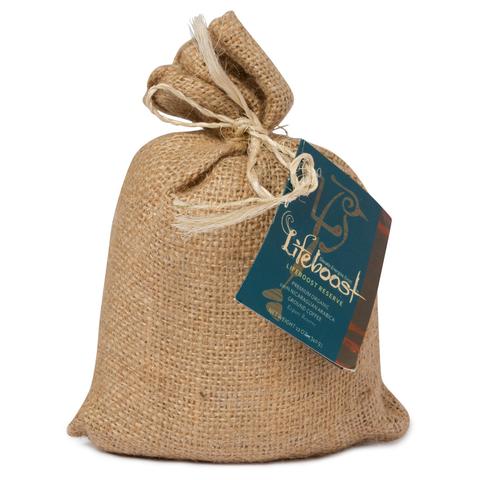
Lifeboost Coffee
Enjoy delicious, healthy, single-origin, chemical-free, non-GMO coffee from small farms in the mountains of Nicaragua
Ranking in at number one on our list is Lifeboost Coffee. Known for its overall richness and sweet chocolate and caramel undertones, this organic coffee is one of the healthiest whole bean coffees available. Smooth in body, Lifeboost is delectable and is also an organic, fair-trade certified, shade-grown coffee brand.
Perhaps the most important characteristic that we love about Lifeboost is its unbelievably low acidity. The alkaline balance in Lifeboost gives it a succulent flavor and makes it easy on the stomach in comparison to more acidic coffees from other brands.
And how does Lifeboost achieve this? By only harvesting the top 0.5% of single-origin Arabica beans, mostly from Nicaragua, Lifeboost ensures that only the ripest coffee beans are selected for processing. In addition, as the coffee beans are processed, Lifeboost ensures the removal of any potential mycotoxins that may be present in the coffee.
Ultimately, when it comes to attention to detail and dedication to quality, Lifeboost coffee can’t be beaten. For a nice introduction to the brand, we recommend Lifeboost’s Medium Roast and Lifeboost’s Dark Roast Coffee for a delicious acclimation to the flavor profiles that Lifeboost has to offer. Read our full review of Lifeboost’s coffee, here.
Volcanica Wallenford Peaberry Jamaican Blue Mountain Coffee
Jamaican Blue Mountain coffee is a high-quality coffee that’s in high demand for a multitude of reasons. Some include the limited farmland space on the island, longer cultivation period, and surprisingly enough, around 80% of Jamaican Blue Mountain coffee is actually exported to Japan, while the remaining 20% is left for the rest of the world. That’s why Volcanica Coffee does it right with its Wallenford Peaberry Jamaican Blue Mountain Coffee single-origin roast.
Amplifying the deepest notes of flavor within their coffee beans, Volcanica also preserves the authentic qualities present in JBM beans. Typically, many single-origin coffees like JBM have notes of herbal and floral flavors with slight cocoa and nutty undertones. This roast in particular is a medium roast to ensure the preservation of the inner-most flavor notes of chocolate and citrusy orange.
Located in Atlanta, Georgia, Volcanica coffee also ensures that you can receive your bag of perfectly roasted whole bean Jamaican coffee within 3-30 days after roasting is complete. All you need to do is sit back, relax, and wait for your one-of-a-kind authentic coffee to arrive at your front door!
Cooper’s Kenya AA Coffee Beans
There are many quality Kenyan coffees on the market, but Cooper’s Kenya AA does it like no other brand. Kenyan coffee beans are an extremely popular type of bean, and they’ve been purchased and marketed by many larger-scale coffee corporations. Even so, nobody does roasted coffee better than smaller chain coffee companies.
That’s why Cooper’s holds a spot on our list as one of the best small chain coffee roasters for Kenyan AA coffee. Roasting coffee since 2014, all of Cooper’s coffee is completely organic and fair-trade certified. In fact, Cooper’s filters through their Kenyan beans and only selects the highest grade Kenyan AA beans of the Bourbon varietal to roast.
These beans in particular exhibit sweeter notes of flavor like tart, succulent fruit, and sweet honey undertones. Roasted to a medium-dark level, you can expect a rich taste as well as a medium body with a flavor combination of sweeter honey and chocolate amplified with notes of cherry fruitiness. Cooper’s Kenyan AA roast will make for delicious coffee in a variety of brewing methods, though we believe this one especially makes for an excellent option for cold brew coffee.
Volcanica Kenyan AA Beans
Though they’ve already appeared once on our list, when it comes to high-quality coffee, especially single-origin Arabica beans, Volcanica Coffee fails to disappoint. Similar to Cooper’s Coffee, Volcanica has an appreciation of detail orientation that we admire, and the company’s dedication to quality is what allows it to hold another spot on our list.
For Volcanica’s Kenyan AA roast, you can expect a vibrant yet not overwhelming acidity, as well as fruity notes of raspberry, cranberry, and earthy redwood tones. Unlike Cooper’s darker roasted beans, Volcanica’s Kenyan roast is a nice balance between a light roast and a medium roast. This means it’s not only delicious but it’s also higher in caffeine content.
Koa Coffee
A delectable, well-balanced medium roast, the rich flavor of fruit and chocolate present within this roast will leave you craving a second cup with every sip. Smooth and full-bodied, Koa Coffee makes a delicious cup of coffee that’s rich with undertones of caramel and chocolate.
A little pricier, Koa Coffee ensures that every bag of coffee you receive is carefully cultivated and artisan crafted. The larger price tag is a green light that displays the quality and authenticity of not just the coffee beans themselves, but the integrity of the Koa brand as well.
The best thing that we enjoy about Koa Coffee is that you get 100% Kona Coffee beans, unlike other brands who make up their blends mostly of arabica beans, with 10% of those only being quality Kona beans. If you’re looking to get the best quality Kona beans possible, stay away from brands that advertise as Kona Blends.
However, other brands that offer Kona Coffee through Amazon are Volcanica Coffee and Don Francisco. Similar to Koa, Volcanica offers larger amounts of Kona whole coffee beans in higher volumes.
Likewise, if you want to experience Kona Coffee in some form without breaking the bank, then we suggest an off-brand, lower-quality Kona Coffee from coffee companies like Don Francisco. Fair warning when it comes to Don Fransisco though: these are not 100% Kona beans. As we’ve mentioned before, they are a Kona Blend. But–it saves you some bucks until you can experience higher quality, Kona, then Don Francisco has you covered.
The Best Arabica Coffee: The Beans
Though coffee has played a significant part in societal and cultural life for thousands of years, coffee first originated in the nutrient-rich soils of Ethiopia: the birthplace of arabica coffee beans. Today, there are SO many different kinds of arabica beans grown in different areas across the world. The best way to judge the differences between arabica beans? Look at the single-origin qualities.
But how can you separate the high-quality arabica beans from the lower quality arabica beans? For our own organization, we’re going to start by describing and highlighting some of the best single-origin beans from different parts of the world, and then highlight which brands uphold these different single-origin standards well.
Qualities about good arabica coffee (caffeine, cultivation methods, level of scale–small scale vs large scale).
Nicaraguan Coffee Beans
Coffee production in Nicaragua has a long history spanning over the course of 150+ years. Located in Central America, the small country packs a big punch in the global coffee industry, currently ranked as 12th in line for the largest exporter of coffee in the world. Coffee has been one of the largest pieces in the country’s economy as a whole, as it exports around 132,000 metric tons of coffee beans each year.
The answer to Nicaragua’s popularity when it comes to succulent coffee beans is a simple one: the country’s climate. Surrounded by ocean on two sides and filled with a plethora of lakes and volcanoes, not only does the area receives a decent amount of precipitation, but the tropical landscape makes for rich soil, adequate sunshine, and elevation that’s high enough to where coffee trees don’t just grow, but they thrive.
Coffee aficionados characterize the flavor of Nicaraguan beans as having a smooth body with a brighter yet pleasant acidity that’s more on the citrusy side. With undertones of sweet chocolates and highlights of floral and citrus, they’re incredibly aromatic and vibrant in flavor. If roasted correctly to highlight the rich flavors of the beans, Nicaraguan beans are a great choice for black coffee lovers and latte lovers alike.
Jamaican Blue Mountain Coffee Beans
Expert coffee connoisseurs and amateur coffee addicts alike all agree on one thing: Jamaican Blue Mountain coffee is one of the most highly ranked coffees in the world, and rightly so. Coffee was first introduced to the Caribbean island in 1728, and over time the crop has flourished through authentic cultivation methods and the overall nutrient-rich climate of the tropical area.
In fact, Jamaican coffee is so special unique that the Coffee Industry Regulation Act has created strict regulations on which coffee grown in Jamaica can be officially classified under the Blue Mountain label. Only coffees harvested around the Blue Mountain Ridge in the areas of Saint Andrew, Saint Thomas, Portland, and Saint Mary parishes can be marketed as Jamaican Blue Mountain Coffee and has to be grown at an elevation of 3,000-5,500 feet.
Furthermore, Jamaican coffee is also graded according to possible size differences and potential defects. Like most coffees, Jamaican Blue Mountain Coffee is separated into different categories based on factors such as appearance, size, and defects. For example, beans rated as “Number 1” are usually the largest Jamaican coffee beans and have the least amount of potential defects with the highest flavor potential. Following this is the rank of “Number 2,” and “Number 3,” which consists of peaberry coffee beans and beans that aren’t the usual flat coffee beans.
Kenyan AA Coffee Beans
Succulent coffee beans aren’t only located in Central/South America! Kenyan AA beans are some of the ripest beans that Africa has to offer. Loved by many for its notable full body and crisp flavor, Kenyan coffee has grown to be one of the higher ranking exporters for coffee across the globe.
Grown in Kenya’s volcanic soil, Kenyan AA beans can be expected to possess notes of citrus and white wine. This is because Kenyan coffee is cultivated from 4,500-6500 feet above sea level on smaller-scale local farms in the mountainous, volcanic soils throughout the central and eastern parts of the country. Likewise, the smaller-scale cultivation process is closely monitored with great attention to detail, further ensuring that the complex flavors within the beans are enhanced.
When ranking Kenyan Coffee beans, the highest ranks AA for the beans of the largest size, while beans of the second rank follow in the AB category. One of the most interesting factors about Kenyan coffee beans is that the Kenyan government actually holds an annual auction to determine what the highest quality coffees are, and which ones can sell for better prices. The great thing about this is that it encourages Kenyan farmers to continuously improve the quality of their coffee crops each year.
Kona Coffee Beans
Kona Coffee is a world-class Hawaiian coffee that is exclusively cultivated on the mountainsides of two volcanoes, Hualalai and Mauna Loa–both located on the Big Island of Hawaii. Sourced in the rich volcanic soil, all Kona Coffee is hand-picked, pulped, dried, and hulled by hand. Due to its unparalleled level of cultivation, Kona Coffee beans are in extremely high demand with limited supply.
The classification of Kona beans is ranked according to the type of coffee seeds within the coffee cherry. Type I (two beans per cherry), Type II (one round bean per cherry–otherwise known as peaberry), and further grades of coffee beans are graded according to moisture content, size, and quality. It’s important to determine which Kona coffees are the real deal, and which ones are scams (because trust us, they’re out there). Higher grade coffee beans (Types I and II) are able to be legally marketed as Certified Kona Coffee, while lower grades are often marketed as “Hawaiian Coffee.”
Some classifications of Type I Kona Coffee include “Kona Extra Fancy,” “Kona Fancy,” “Kona Number 1,” Kona Select,” and “Kona Prime.” Typically, the flavor profile of these beans is more chocolatey with subtle hints of fruity flavor, partnered with the foundation of sweeter chocolate and nutty undertones. Though roasting at any level will bring out the flavor in the coffee, many Kona Coffee lovers enjoy it for medium/darker roasts.
Tips For Trying Arabica Coffee
Now, there are some things to remember when trying different arabica coffees. If you’re trying an array of single-origin roasts, we recommend these tricks to help you get the most out of your coffee tasting experiment:
Whole Bean Is Better
We get it. We know that for the homebrewers who don’t have a coffee grinder accessible, pre-ground coffee is incredibly easy and convenient. However, your coffee immediately begins to go stale the second that you grind it.
That’s why, if you can, we HIGHLY recommend purchasing your arabica coffee, especially if it’s high-quality grade like Kona or Jamaican Blue Mountain, don’t do yourself a disservice by missing out on some of the vibrant flavors. After all, if you want to enjoy some of the most mouth-watering arabica coffee, experience it to the fullest.
Don’t Buy In Bulk
Like buying pre-ground coffee, the primary (and only) benefit to buying bulk-size packages of whole bean arabica coffee is that it will take longer to brew and go through. The most efficient thing to do is to buy smaller bags and grind and brew as needed, that way your coffee is always guaranteed as fresh as possible.
The Verdict
Every coffee lover deserves the opportunity to experiment with carefully cultivated and deliciously brewed arabica coffee.
Remember, the most important thing to keep in mind when selecting your arabica coffee is quality over efficiency–and any of these coffees are excellent options to enjoy! So have fun brewing the best arabica coffee on the market today, and as always:
Happy caffeinating!

